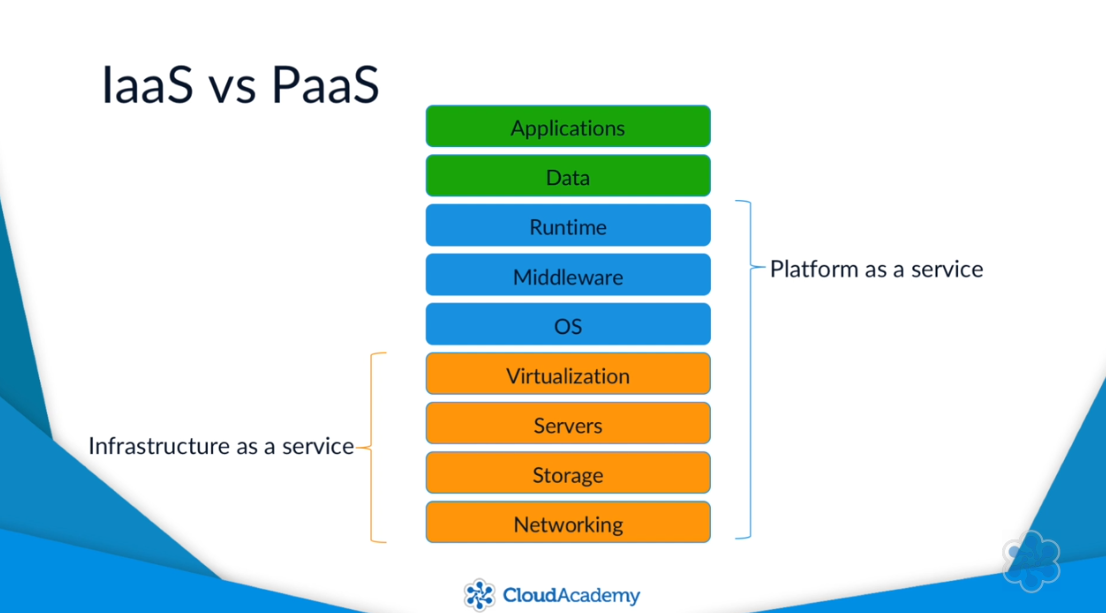GCP Systems Operations
Project resources
- global resources
- firewall rules
- regional-based resources
- IP addresses
- zone-based resources
- instance
- disks
Interacting with GCP
- Cloud Console - web interface
- Cloud SDK/Cloud Shell - CLI
- REST-based API
Cool links:
Compute Engine Instances
IaaS vs PaaS

Machine Types
- High Memory
- 6.50GB of RAM per vCPU
- High CPU
- 0.90GB of RAM per vCPU
- Standard
- 3.75GB of RAM per vCPU
- Shared-core
- One virtual CPU
- Cost-effective for running small, non-resource intensive apps
- Custom machine types
- Select the cores and memory
Instance states
Provisioning > Staging > Running > Stopping > Terminated
Check instance state with:
gcloud compute instances describe $INSTANCE
Networking
If you have several instances, it's not a good idea to expose all of them to the public internet. Instead:
- Use a bastion
- Limit CIDR range of source IPs connecting to bastion
- Firewall rules allow SSH traffic to private instances only from bastion
Snapshots
- Create a copy of a disk
- Store only data that's changed since the last snapshot
- Snapshot a running instance for point in time backups
- Snapshots are a global resource
- Use cases:
- Backps
- Migrating data between zones
- Swapping between disk types
- Snapshots are data only
Creating snapshots
- unmount the disk or prevent writes
sudo umount $mountPoint- for a boot disk, shutdown the instance
- if you can't umount, use
syncandfsfreeze
Instance Groups
- Manage groups of instances
- Perform simple management tasks, including:
- Monitor CPU, disk, and network traffic across the group
- Reboot all instances in the group
- Two types:
- Managed: template defining the instances
- Unmanaged: collection of instances not necessarily identical
Cloud SQL
Basic stuff...
Metadata
Present in Compute Engine tab.
- A set of key/value pairs containing info related to the running instance or project
- Project level settings
- API keys
- Connection strings
- Access tokens
- Instance level settings
- Tags
- Zones
- Flag to determine if the instance is pre-emptible
- hostname
Startup / Shutdown Scripts
Scripts that run when an instance is starting up (or shutting down).
All startup script output is written to /var/log/daemon.log.
See also /var/log/startupscript.log.
Common uses:
- installing a provisioning client:
- chef
- puppet
- ansible?
- run security checklist
- bootstrap batch processing node
Shutdown script:
- run as a "best-effort"
- Triggered by:
- instances.delete / instances.stop
- When Compute Engine stops a pre-emptible instance
- normal shutdown...
- use cases
- backup logs
- copying data to cloud storage
- clean terminating apps
Auto Scaling
- Compute Engine API
- Auto scale the number of instances in a managed instance group
- helps reduce costs by shutting down instances when not required
- one autoscaler per managed instance group
Policies
- policy determines autoscaler behavior
- options:
- Average CPU utilization
- HTTP load balancing serving capacity (defined in the backend service)
- Stackdriver standard and custom metrics
Load Balancer
- 3 types:
- TCP
- UDP
- HTTP
- Network Load balancer
- TCP and UDP
- Balance load based on incoming IP protocol data:
- IP address
- Port
- Protocol type
- Allows packet inspection
- Does NOT support cross-region balancing
- Can maintain session affinity (useful for stateful apps)
- HTTP Load Balancer
- Distributes HTTP(S) traffic among groups of instances based on:
- Proximity to the user
- Request URL - URL rules route requests to instances
- Requires instance groups
- Supports session affinity
- Supports connection draining
- Distributes HTTP(S) traffic among groups of instances based on:
Note
Cloud Load Balancer is going to be a key component in any Compute Engine based, highly available workload. So take the time to test it out and get to know it.